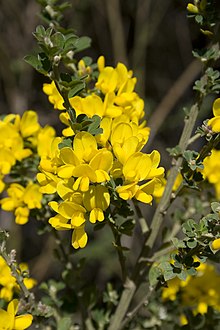Genista
| Genista | |
|---|---|
 |
|
| French Broom | |
| Scientific classification | |
| Kingdom: | Plantae |
| (unranked): | Angiosperms |
| (unranked): | Eudicots |
| (unranked): | Rosids |
| Order: | Fabales |
| Family: | Fabaceae |
| Subfamily: | Faboideae |
| Tribe: | Genisteae |
| Genus: |
Genista L. |
| Species | |
|
See text. |
|
| Synonyms | |
|
|
See text.
Genista /dʒɛˈnɪstə/ is a genus of flowering plants in the legume family Fabaceae, native to open habitats such as moorland and pasture in Europe and western Asia. They include species commonly called broom, though the term may also refer to other genera, including Cytisus and Chamaecytisus. Brooms in other genera are sometimes considered synonymous with Genista: Echinospartum, Retama, Spartium, Stauracanthus, and Ulex.
They are mainly deciduous shrubs and trees, often with brush-like foliage, often spiny to deter grazing, and masses of small, pea-like yellow blooms which are sometimes fragrant. Many of the species have flowers that open explosively when alighted on by an insect, the style flying through the upper seam of the keel and striking the underside of the insect, followed by a shower of pollen that coats the insect.
The name of the Plantagenet royal line is derived from this genus, being a dialectal variation of planta genista.
Genista comprises the following species:
The status of the following species is unresolved:
The following hybrids have been described:
...
Wikipedia
